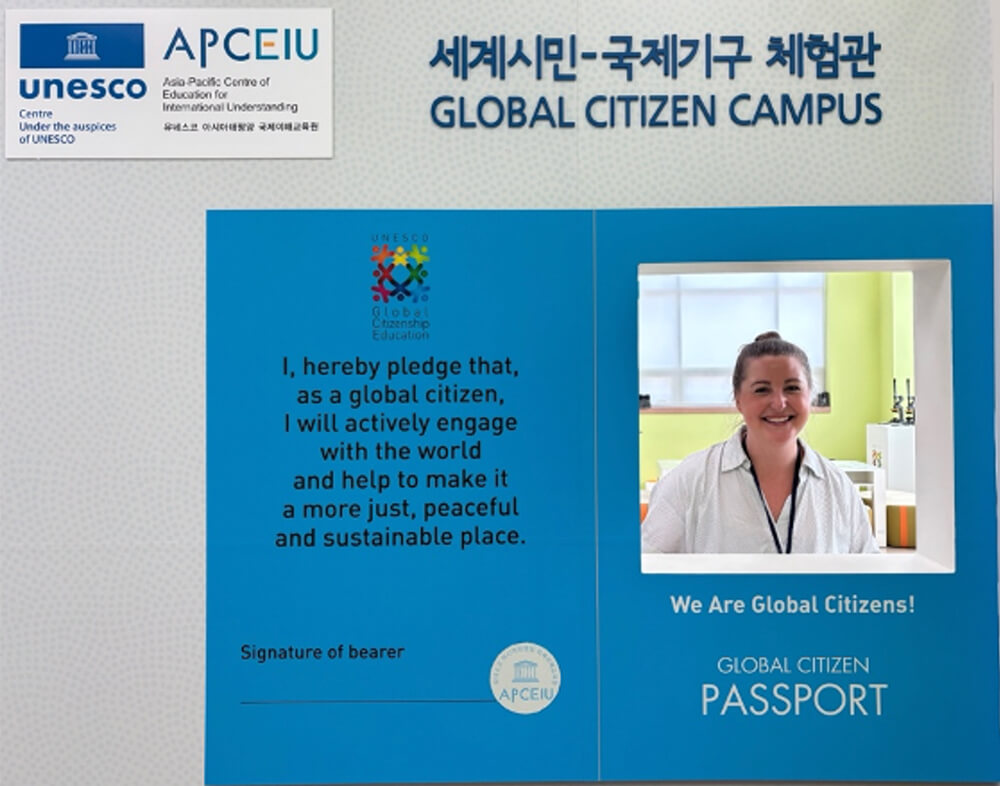
For the past month, I have been working as a GW UNESCO Fellow at the Asia-Pacific Center of Education for International Understanding (APCEIU) in Seoul, South Korea. In pursuing this Fellowship, one of my primary goals was to continue growing in my understanding of global citizenship. UNESCO defines global citizenship as “a sense of belonging to common humanity, viewing the local and national as connected to the global, understanding and engaging with others and the environment, while respecting diversity and upholding universal values” (UNESCO, 2014).
Since I’ve been here, APCEIU has hosted two convenings. In June, the Office of Education and Training hosted the 24th Asia-Pacific Training Workshop (APTW) on EIU (Education for International Understanding)/Global Citizenship Education (GCED). And in July, the Office of Research and Development hosted the 2025 Expert Meeting on Evaluation and Assessment for Transformative Education: Towards and Beyond 2030. Between the two meetings, about 40 participants representing about 25 countries shared what transformative education means to them, how they show up as global citizens, and how they incorporate GCED into their classrooms, schools, and communities.
What is GCED you ask? Global Citizenship Education is all about “teaching and learning to become these global citizens who live together peacefully on one planet” through adjustment of curricula in schools, nurturing of cognitive and social skills of students, instilling of values, and adopting behaviors all related to the interconnectedness of our world, empathy for those around it, and justness and fairness for everyone (UNESCO, 2025). And of course this can take so many forms.

After lunch one day, my colleagues and I were sitting around the staff table drinking tea, chit-chatting about anything and everything. We were drinking rooibos tea and wondering “where does this come from?” We were talking about where unpurchased clothes go and remembering the huge import/export issues that resulted from the Suez Canal blockage in 2021. We were commiserating about how absurdly expensive Häagen-Dazs chocolate ice cream is, but how it’s too delicious to pass up! We were sharing cultural traditions and folktales from our countries. One of my colleagues used an expression that she thought was an American expression and it definitely wasn’t and we all just burst out laughing! After all of this, another colleague takes in a quick breath and goes “You know, all of this we’ve been discussing is GCED!”
And she was so right. GCED can be exemplified in many different ways depending on the context. My understanding and conceptualization of GCED has grown exponentially from all the experiences and opportunities I’ve had here so far. The mission of APCEIU is to promote education for international understanding and global citizenship towards a culture of peace, and they do this through: research and policy development, capacity-building, development of teaching and learning materials, international teacher exchange, and information sharing and networking.

At the training workshop in June, we heard from participants from Afghanistan, Bhutan, and Indonesia, who had all previously participated in the GCED 101 program hosted by APCEIU. They each shared such different stories of how they have brought GCED back to their communities, further exemplifying how different global citizenship education can look in each context. Each example can be categorized into one of these five themes: human rights, globalization and social justice, sustainability, respect for diversity, and conflict and peace-building. In some countries, it is seen as empowerment of women through education. In others, it is seen as sustainability efforts. But in all instances, individuals are out there committed to living as active and engaged global citizens!
I am excited for the second half of the summer to dive deeper into the work APCEIU does and find opportunities to hear directly from Korean teachers who are incorporating GCED into their classrooms and schools.

Isabelle Cooksey is a M.A. Candidate in the International Education Program at the George Washington University. Her area of focus is Global Citizenship Education in the K-12 space.


